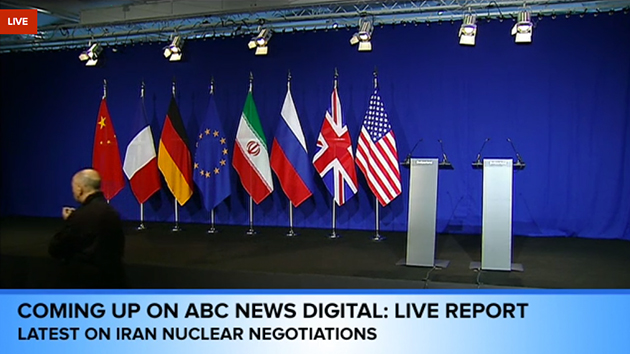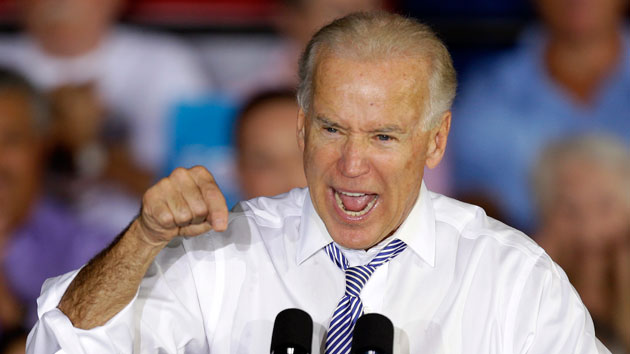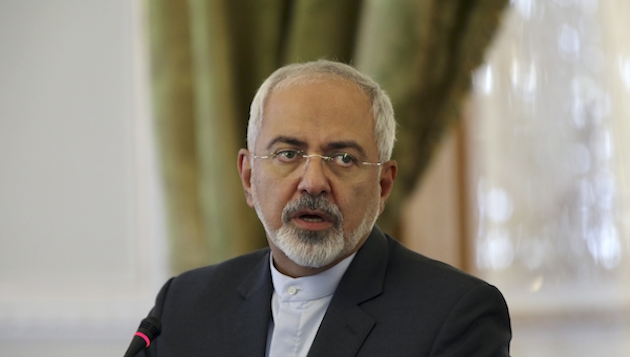Speaking from the Rose Garden on Thursday, President Obama addressed a preliminary agreement reached earlier in the day that seeks to limit Iran’s controversial nuclear program. The deal, which includes the participation of European allies, is expected to lead to a final phase of negotiations before a set June 30 deadline.
“I am convinced that if this framework leads to a final compromise deal, it will make our country, our allies, and our world safer,” Obama said on Thursday. “This has been a long time coming.”
Obama said that any “backsliding” on Iran’s part would lead to the deal’s collapse. In the press conference, the president also reaffirmed his commitment to protecting peaceful interests in Israel and the Middle East. Prior to Obama’s address, both sides, although optimistic, noted key differences still remained.
Watch the full press conference below:
For the text on the preliminary agreement, read the document here. Here’s the transcript of Obama’s press conference courtesy of the Washington Post below:
Today, the United States, together with our allies and partners, has reached a historic understanding with Iran, which, if fully implemented, will prevent it from obtaining a nuclear weapon.
As president and commander in chief, I have no greater responsibility than the security of the American people, and I am convinced that if this framework leads to a final, comprehensive deal, it will make our country, our allies, and our world safer. This has been a long time coming.
The Islamic Republic of Iran has been advancing its nuclear program for decades. By the time I took office, Iran was operating thousands of centrifuges, which can produce the materials for a nuclear bomb. And Iran was concealing a covert nuclear facility.
I made clear that we were prepared to resolve this issue diplomatically, but only if Iran came to the table in a serious way.
When that did not happen, we rallied the world to impose the toughest sanctions in history, sanctions which had a profound impact on the Iranian economy.
Now, sanctions alone could not stop Iran’s nuclear program, but they did help bring Iran to the negotiating table. Because of our diplomatic efforts, the world stood with us, and we were joined at the negotiating table by the world’s major powers: the United Kingdom, France, Germany, Russia and China as well as the European Union.
Over a year ago, we took the first step towards today’s framework with a deal to stop the progress of Iran’s nuclear program and roll it back in key areas.
And recall that at the time, skeptics argued that Iran would cheat, that we could not verify their compliance, and the interim agreement would fail. Instead, it has succeeded exactly as intended. Iran has met all of its obligations.
It eliminated its stockpile of dangerous nuclear material, inspections of Iran’s program increased, and we continued negotiations to see if we could achieve a more comprehensive deal.
Today, after many months of tough principle diplomacy, we have achieved the framework for that deal. And it is a good deal, a deal that meets our core objectives.
This framework would cut off every pathway that Iran could take to develop a nuclear weapon. Iran will face strict limitations on its program, and Iran has also agreed to the most robust and intrusive inspections and transparency regime ever negotiated for any nuclear program in history. So this deal is not based on trust. It’s based on unprecedented verification.
Many key details will be finalized over the next three months. And nothing is agreed to until everything is agreed. But here are the basic outlines of the deal that we are working to finalize.
First, Iran will not be able to pursue a bomb using plutonium because it will not develop weapons grade plutonium. The core of its reactor at Arak will be dismantled and replaced. The spent fuel from that facility will be shipped out of Iran for the life of the reactor. Iran will not build a new heavy water reactor. And Iran will not reprocess fuel from its existing reactors, ever.
Second, this deal shuts down Iran’s path to a bomb using enriched uranium. Iran has agreed that its installed centrifuges will be reduced by two thirds. Iran will no longer enrich uranium at its Fordo facility. Iran will not enrich uranium with its advanced centrifuges for at least the next 10 years. The vast majority of Iran’s stockpile of enriched uranium will be neutralized.
Today, estimates indicate that Iran is only two or three months away from potentially acquiring the raw materials that could be used for a single nuclear bomb. Under this deal, Iran has agreed that it will not stockpile the materials needed to build a weapon. Even if it violated the deal, for the next decade at least, Iran would be a minimum of a year away from acquiring enough material for a bomb. And the strict limitations on Iran’s stockpile will last for 15 years.
Third, this deal provides the best possible defense against Iran’s ability to pursue a nuclear weapon covertly, that is in secret. International inspectors will have unprecedented access not only to Iranian nuclear facilities, but to the entire supply chain that supports Iran’s nuclear program, from uranium mills that provide the raw materials to the centrifuge production and storage facilities that support the program.
If Iran cheats, the world will know it. If we see something suspicious, we will inspect it. Iran’s past efforts to weaponize its program will be addressed.
With this deal, Iran will face more inspections than any other country in the world. So, this will be a long-term deal that addresses each path to a potential Iranian nuclear bomb.
There will be strict limits on Iran’s program for a decade. Additional restrictions on building new facilities or stockpiling materials will last for 15 years. The unprecedented transparency measures will last for 20 years or more. Indeed, some will be permanent. And as a member of the Nuclear Non-Proliferation Treaty, Iran will never be permitted to develop a nuclear weapon.
In return for Iran’s actions, the international community has agreed to provide Iran with relief from certain sanctions. Our own sanctions and international sanctions imposed by the United Nations Security Council. This relief will be phased, as Iran takes steps to adhere to the deal. If Iran violates the deal, sanctions can be snapped back into place.
Meanwhile, other American sanctions on Iran for its support of terrorism, its human rights abuses, its ballistic missile program, will continue to be fully enforced.
Now let me re-emphasize, our work is not yet done. The deal has not been signed. Between now and the end of June, the negotiators will continue to work through the details of how this framework will be fully implemented and those details matter.
If there is backsliding on the part of the Iranians, if the verification and inspection mechanisms don’t meet the specifications of our nuclear and security experts, there will be no deal.
But if we can get this done and Iran follows through on the framework that our negotiators agreed to, we will be able to resolve one of the greatest threats to our security and to do so peacefully.
Given the importance of this issue, I have instructed my negotiators to fully brief Congress and the American people on the substance the deal. And I welcome a robust debate in the weeks and months to come.
I am confident that we can show that this deal is good for the security of the United States, for our allies and for the world.
But the fact is we only have three options for addressing Iran’s nuclear program. First, we can reach a robust and verifiable deal, like this one, and peacefully prevent Iran from obtaining a nuclear weapon.
The second option is we can bomb Iran’s nuclear facilities, thereby starting another war in the Middle East and setting back Iran’s program by a few years. In other words, setting it back by a fraction of the time that this deal will set it back. Meanwhile, we’d ensure that Iran would raise their head to try and build a bomb.
Third, we could pull out of negotiations, try to get other countries to go along and continue sanctions that are currently in place or add additional ones and hope for the best. Knowing that every time we have done so, Iran has not capitulated, but instead has advanced its program. And that in very short order, the breakout timeline would be eliminated and a nuclear arms race in the region could be triggered because of that uncertainty.
In other words, the third option leads us very quickly back to a decision about whether or not to take military action because we’d have no idea what was going on inside of Iran. Iran is not going to simply dismantle its program because we demand it to do so.
That’s not how the world works. And that’s not what history shows us. Iran has shown no willingness to eliminate those aspects of their program that they maintain are for peaceful purposes, even in the face of unprecedented sanctions.
Should negotiations collapse because we, the United States, rejected what the majority of the world considers a fair deal, what our scientists and nuclear experts suggest would give us confidence that they are not developing a nuclear weapon, it’s doubtful that we could even keep our current international sanctions in place.
So when you hear the inevitable critics of the deal sound off, ask them a simple question: Do you really think that this verifiable deal, if fully implemented, backed by the world’s major powers, is a worse option than the risk of another war in the Middle East? Is it worse than doing what we’ve done for almost two decades with Iran moving forward with its nuclear program and without robust inspections?
I think the answer will be clear. Remember, I have always insisted that I will do what is necessary to prevent Iran from acquiring a nuclear weapon, and I will.
But I also know that a diplomatic solution is the best way to get this done and offers a more comprehensive and lasting solution. It is our best option by far. And while it is always a possibility that Iran may try to cheat on the deal in the future, this framework of inspections and transparency makes it far more likely that we’ll know about it if they try to cheat, and I or future presidents will have preserved all of the options that are currently available to deal with it.
To the Iranian people, I want to reaffirm what I’ve said since the beginning of my presidency. We are willing to engage you on the basis of mutual interests and mutual respect.
This deal offers the prospect of relief from sanctions that were imposed because of Iran’s violation of international law. Since Iran’s supreme leader has issued a fatwa against the development of nuclear weapons, this framework gives Iran the opportunity to verify that it’s program is, in fact, peaceful. It demonstrates that if Iran complies with its international obligations, then it can fully rejoin the community of nations, thereby fulfilling the extraordinary talent and aspirations of the Iranian people. That would be good for Iran, and it would be good for the world.
Of course, this deal alone, even if fully implemented, will not end the deep divisions and mistrust between our two countries. We have a difficult history between us.
And our concerns will remain with respect to Iranian behavior so long as Iran continues its sponsorship of terrorism, its support for proxies who destabilize the Middle East, its threats against America’s friends and allies, like Israel.
So make no mistake, we will remain vigilant in countering those actions and standing with our allies.
It’s no secret that the Israeli prime minister and I don’t agree about whether the United States should move forward with a peaceful resolution to the Iranian issue. If in fact Prime Minister Netanyahu is looking for the most effective way to ensure Iran doesn’t get a nuclear weapon, this is the best option.
And I believe our nuclear experts can confirm that.
More importantly, I will be speaking with the prime minister today to make clear that there will be no daylight, there is no daylight when it comes to our support for Israel’s security and our concerns about Iran’s destabilizing policies and threats towards Israel.
That’s why I’ve directed my national security team to consult closely with the new Israeli government in the coming weeks and months about how we can further strengthen our long-term security cooperation with Israel and make clear our unshakeable commitment to Israel’s defense.
Today, I also spoke with the king of Saudi Arabia, to reaffirm our commitment to the security of our partners in the Gulf. And I am inviting the leaders of the six countries who make up the Gulf Cooperation Council, Saudi Arabia, United Arab Emirates, Kuwait, Oman, Qatar, and Bahrain to meet me at Camp David this spring to discuss how we can further strengthen our security cooperation while resolving the multiple conflicts that have caused so much hardship and instability throughout the Middle East.
Finally, it’s worth remembering that Congress has, on a bipartisan basis, played a critical role in our current Iran policy, helping to shape the sanctions regime that applied so much pressure on Iran and ultimately forced them to the table.
In the coming days and weeks, my administration will engage Congress once again about how we can play — how it can play a constructive oversight role. I’ll begin that effort by speaking to the leaders of the House and the Senate today.
In those conversations, I will underscore that the issues at stake here are bigger than politics. These are matters of war and peace. And they should be evaluated based on the facts, and what is ultimately best for the American people and for our national security. For, this is not simply a deal between my administration and Iran. This is a deal between Iran, the United States of America and the major powers in the world, including some of our closest allies.
If Congress kills this deal not based on expert analysis, and without offering any reasonable alternative, then it’s the United States that will be blamed for the failure of diplomacy. International unity will collapse, and the path to conflict will widen.
The American people understand this, which is why a solid majority support a diplomatic resolution to the Iranian nuclear issue. They understand instinctively the words of President Kennedy, who faced down the far greater threat of Communism, and said, “Let us never negotiate out of fear, but let us never fear to negotiate.” The American people remembered that at the height of the Cold War.
Presidents like Nixon and Reagan struck historic arms control agreements with the Soviet Union, a far more dangerous adversary, despite the fact that that adversary not only threatened to destroy our country and our way of life, but had the means to do so.
Those agreements were not perfect. They did not end all threats. But they made our world safer. A good deal with Iran will do the same. Today I’d like to express my thanks to our international partners for their steadfastness, their cooperation.
I was able to speak earlier today with our close allies, Prime Minister Cameron and President Holland and Chancellor Merkel, to reaffirm that we stand shoulder-to-shoulder in this effort. And most of all, on behalf of our nation, I want to express my thanks to our tireless — and I mean tireless — Secretary of State John Kerry and our entire negotiating team. They have worked so hard to make this progress. They represent the best tradition of American diplomacy.
Their work, our work, is not yet done and success is not guaranteed. But we have a historic opportunity to prevent the spread of nuclear weapons in Iran and to do so peacefully, with the international community firmly behind us. We should seize that chance. Thank you. God bless you. And god bless the United States of America.
















